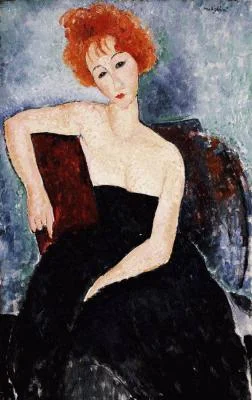The current political climate has me feeling nauseous.
I'm not asking to not hear about it - indeed, I read as much as I can handle. I'm not asking to hide from it - I think the calamitous clash is a symptom of a privileged society that has tried to hide too long. #colormeliberal
But I will say this: the blatant misrepresentation and mishandling of the truth is terrifying to me. I'm not talking about government transparency. I'm not talking about interpretation of facts or political philosophy. I'm talking about compromised truth.
I'll admit, I'm naive. I believe there is a truth in all things - a bottom line - which many people do not. But I also believe that, insofar as we can understand that truth, it's more of a whispered breeze than a mathematical treatise inked in black and white.
I studied art history in college, and that colors my perception of what truth is. Because art history isn't about solving problems. It's about discovering them. There are a million truths associated with any given painting - its meaning, its purpose, its effect. Context is always king, but context doesn't inspire creation; the search for truth does.
How does where you stand affect your perspective?
That's why artists have a love/hate relationship with critics. The critic, one can argue, doesn't initiate creation. He comments on how he sees what is before him.
Art critics are like opinion editorialists. (I'm an opinion editorialist.) The lion's share of their argument is based in a reality created by someone or something else. They are creative, yes. But they are not originators.
Modern media (and I mean BOTH sides) has learned in the last decade that to survive, they must earn clicks. And hyperbole and click-bait and cat-videos get clicks. Because the average Joe doesn't want to be challenged, or to learn, or to hear something that might make him uncomfortable. And so the Modern Media transformed into critics who spin and fluff the truth in order to make it clickable.
The 4th Estate needs to forsake the attention-seeking behavior and get back to what they were intended to do. Report what happens. Try really really really hard not to weight reporting with opinion. Publish the spin and the interpretation under op. eds.
Why? Well, just because. It's not going to earn money, but it earn respect.
Because most people can't identify an author's sly insertion of spin.
In High School AP English and AP History, we filled blue books with permutations and rabbit-hole-runs of ideas, dug right into the foundation-soil of truth, created by it, and yet empty of it, feverishly excavating without realizing the futility. When we wrote ourselves into circles, we got As. When we wrote in absolutes, we missed the point.
That's why the Interdisc Honors program at Villanova was joy and a terror. I wanted so much to put my finger on what was true. To say, "THIS IS," with certainty. Instead, I waltzed with Kant and Kierkegaard and Heidegger, and at the end of it the only thing I could declare with no qualms was, "I am not a Cartesian."
And to compound all this, I've been completely educated in Catholic Schools, from kindergarten through the mortarboard-tassel-switch. Catholicism, a rich and tumultuous religion bedecked with some of the finest artistry ever created, surviving - sometimes seemingly solely - on paradoxes and belief in the unbelievable.
Amadeo Modigliani - Red Headed Girl in Evening Dress (1918)
So the truth? In my humble and indoctrinate-able opinion, it's a holy and enduring and purpose-giving thing, unable to be defiled except in its representation.
Because the truth is indicated by its representation, but its not defined by its representation.
That's why the Cy Twombly room at the Philadelphia Museum of Art is one of my favorite places to sit. Why Modigliani's red-headed woman - What is she thinking? - holds such an allure. It's why I studied humanities, and art history in particular. Because the truth was what everyone was struggling to identify, but there were no absolutes, only guidelines that could be gutted depending on who you studied, how you grew up, where you stood in the gallery.
I'm terrified of what people are doing to the truth, how they presume to own it, how they abuse it.
Because I'm afraid we'll lose it.

